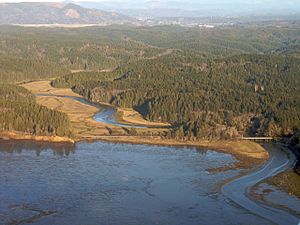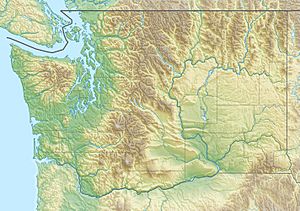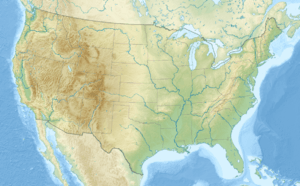Bone River facts for kids
Quick facts for kids Bone River |
|
|---|---|

Mouth of the Bone River
|
|
|
Location of the mouth of the Bone River in Washington
|
|
| Country | United States |
| State | Washington |
| County | Pacific |
| Physical characteristics | |
| Main source | Willapa Hills 46°39′22″N 123°51′19″W / 46.65611°N 123.85528°W |
| River mouth | Willapa Bay 0 ft (0 m) 46°38′57″N 123°55′26″W / 46.64917°N 123.92389°W |
| Length | 6 mi (9.7 km) |
The Bone River is a short river in the U.S. state of Washington. It is about 6 miles (9.7 km) (about 10 kilometers) long. This small river plays an important role in the local environment.
Contents
Exploring the Bone River's Path
The Bone River starts in the hills of southwestern Washington. Its source is near the North Fork Palix River. From there, it flows mostly west.
Where Does the Bone River End?
The river empties into Willapa Bay. This happens near a town called Bay Center. It is just north of the Niawiakum River. The Bone River is only a few miles long from start to finish.
Marshy Lands and Estuaries
Much of the Bone River area is marshy. A marsh is a type of wetland with grassy plants. The river flows into an estuary. An estuary is where a river meets the sea. Here, fresh river water mixes with salty ocean water. This area is also a tidal marshland on Willapa Bay. U.S. Route 101 crosses the river close to where it meets the bay.
A Glimpse into Bone River's Past
In 1853, a widespread illness affected the Pacific Northwest. One of the first known cases was seen near the mouth of the Bone River. A settler named James Swan wrote about this event. He saw the illness among the Chinook people. This happened after several ships had problems near the Columbia River.
Impact on the Chinook People
Swan's writings are the only direct accounts of this illness among the Chinook. Within a year, the Chinook population was greatly reduced. The illness also spread far up the Columbia River. It reached the coasts of Washington and Oregon. It even went as far as Vancouver Island, the Skagit River, and the Nooksack River.
Protecting the Bone River's Nature
A special part of the river's area is protected. It is called the Bone River Natural Area Preserve. This preserve covers about 2,565 acres (1,038 ha) (over 1,000 hectares).
Why is the Preserve Important?
The preserve has the best salt marsh left in Willapa Bay. Salt marshes are wetlands that are flooded by tides. They are very important places for waterfowl. Waterfowl are birds like ducks and geese. They use these areas for food and shelter.
Future Protection Efforts
People are working to protect even more of the Bone River. They also want to protect the nearby Niawiakum River estuary. These efforts help keep the natural environment healthy for animals and plants.
 | George Robert Carruthers |
 | Patricia Bath |
 | Jan Ernst Matzeliger |
 | Alexander Miles |



